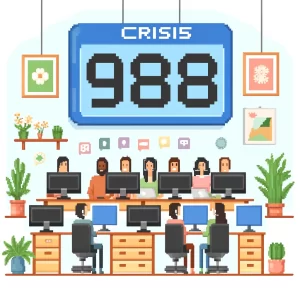
Peer Support in Emergency Departments
Emergency departments (EDs) are often the first point of contact for individuals experiencing crises related to substance use disorders (SUDs). To address the growing opioid crisis, many EDs have started integrating Peer Support Specialists (PSSs) into their patient care teams. This approach has shown promise, but little is known about the specific roles and workflows of these specialists in the ED setting. A recent study sheds light on how PSSs operate in EDs across the United States, highlighting their critical contributions and the challenges they face.
The Role of Peer Support Specialists
Peer Support Specialists are individuals who have lived experience with substance use and recovery. Their primary role is to provide emotional support, share personal recovery experiences, and guide patients through the complexities of accessing treatment. In the context of emergency departments, PSSs play a vital role in bridging the gap between immediate crisis intervention and long-term recovery support.
The study surveyed 11 EDs across nine states to understand how PSS programs are structured and funded. It found that these programs are primarily supported through short-term grants, with only a few receiving sustained funding from hospital budgets. This precarious funding situation poses a significant challenge for the long-term viability of PSS programs.
Key Findings from the Study
The survey revealed several important aspects of PSS programs in emergency departments:
- Funding Sources: Most PSS programs are funded through grants (55%) and hospital funds (46%). However, this funding is typically short-term, averaging only 16 months.
- Services Provided: PSSs offer a range of services, including general recovery support (81%), Screening, Brief Intervention, and Referral to Treatment (SBIRT) services (55%), and naloxone distribution (64%). Notably, fewer PSSs are involved in initiating medications for opioid use disorder (MOUD) in the ED (27%).
- Continued Support Post-Discharge: These programs’ significant strength is their commitment to providing follow-up support after patients are discharged from the ED. Most programs (91%) ensure that patients receive ongoing care, which is crucial for maintaining recovery and preventing relapse.
- Barriers to Implementation: The study identified several barriers to the successful implementation of PSS programs, including a lack of outpatient referral sources, challenges in initiating MOUD, stigma within the healthcare system, and the short-term nature of grant funding.
The Significance of Peer Support in EDs
The inclusion of Peer Support Specialists in emergency departments is a game-changer for patients with substance use disorders. PSSs bring a unique, empathetic perspective that healthcare professionals without lived experience might not fully understand. Their presence can significantly improve patient outcomes by providing immediate support and facilitating seamless transitions to ongoing treatment.
For public health practitioners, the findings of this study underscore the need for sustainable funding models for PSS programs. Given the critical role that PSSs play in supporting patients through the initial stages of recovery, ensuring these programs’ longevity is essential. This might involve integrating PSSs into permanent hospital budgets or developing innovative funding strategies that go beyond short-term grants.
Why Should We Care?
The opioid crisis continues to devastate communities across the United States. Overdose death rates have risen dramatically, making effective interventions more important than ever. Peer Support Specialists offer a promising solution by providing immediate, relatable support to individuals in crisis. Their work not only helps save lives but also enhances the overall effectiveness of the healthcare system’s response to the opioid epidemic.
Let Us Know in the Comments!
- Have you or someone you know experienced support from a Peer Support Specialist? How did it impact the recovery process?
- What are your thoughts on the importance of funding and sustaining PSS programs in emergency departments?
By sharing personal experiences and opinions, readers can contribute to a broader understanding of the vital role that PSSs play in our healthcare system.
Conclusion
The integration of Peer Support Specialists into emergency departments represents a significant advancement in the care of patients with substance use disorders. Despite the challenges of short-term funding and systemic barriers, PSSs are making a tangible difference in patients’ lives. Public health practitioners and policymakers must work together to ensure the sustainability and expansion of these critical programs, ultimately helping to combat the ongoing opioid crisis more effectively.
Boost Your Knowledge – Subscribe and Share!
“Unlock key insights with ‘This Week in Public Health.’ Subscribe for free and share to drive change.
About the Author
Dr. Jonathan P. Scaccia, PhD, is a clinical-community psychologist with expertise in public health science and practice. He has led evaluation and research initiatives focusing on health equity, vaccine distribution, and organizational readiness. Dr. Scaccia has contributed to federal suicide prevention programs and vaccine equity strategies. He has been recognized for his impactful work and is a leading voice in advancing public health practices.



